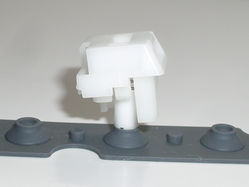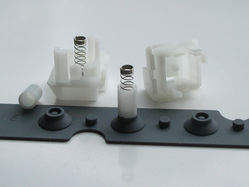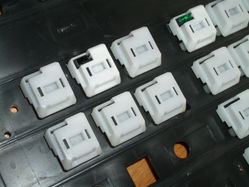Fujitsu Peerless
 | |
| Manufacturer | Fujitsu |
|---|---|
| Sense method | Membrane |
| Total travel | Ca. 3.6 mm |
| Keycap mount | Multiple |
Fujitsu Peerless is a clicky spring over dome switch.
Description
Fujitsu Peerless switches use a curious mechanism to achieve clicks from a dome switch. A plastic cylinder is placed on top of the dome; the cylinder is closed at the bottom, and open at the top. A helical spring is placed into the cylinder; the spring is approximately twice the height of the cylinder's internal capacity. A slider then presses down onto the spring. The mechanism by which the click is achieved is unclear, and may come from the shockwave caused by the dome collapsing under pressure from the cylinder. The click is quiet compared to more common switches, making it fairly well suited to a modern office space; the overall sound level is much less than plate-mounted tactile keyboards.
Full travel is around 3.6 mm, with actuation (pretravel) at around 2.8 mm. The click coincides with switch actuation.
The switch feel is fairly similar to IBM membrane buckling spring, but with greater resistance and a comparatively rough feel. A Model M keyboard feels softer and much smoother in comparison.
Type 2 Peerless keycaps support two, or possibly three different keycap mounts. Most keycaps use a snap-on mount similar to IBM Model M keycaps, with a very small degree of keycap compatibility with Model M keycaps; unlike with the Model M, though, keycaps are a very tight fit and do not come off readily, and using a keycap puller will pull the slider out. Larger keycaps use a peg-and-slot mount very similar to Alps mount but with a larger slot. Both mount types are supported by the same slider design, and some larger keys use both mounts simultaneously. On either side of the slot, are two smaller slits which suggest that, potentially, that could be another keycap mounting option.
Keyboards
- ICL 16022/046 (Type 1)[1]
- Fujitsu FKB4700 (Type 2)
Gallery
Type 1
Type 1 appears to be the older design.[2]
Type 2
This is the most common design. It is not clear whether the keycaps of type 2 are compatible with those of type 1.
Keycap removed from the slider (Fujitsu FKB4700, LED-variant switch)
External links
- YouTube — ICL 16022/046 (reloaded)
References
- ↑ utensilia.tk — ICL 16022/046 (reloaded)
- ↑ geekhack — WTB fujitsu libertouch ANSI













